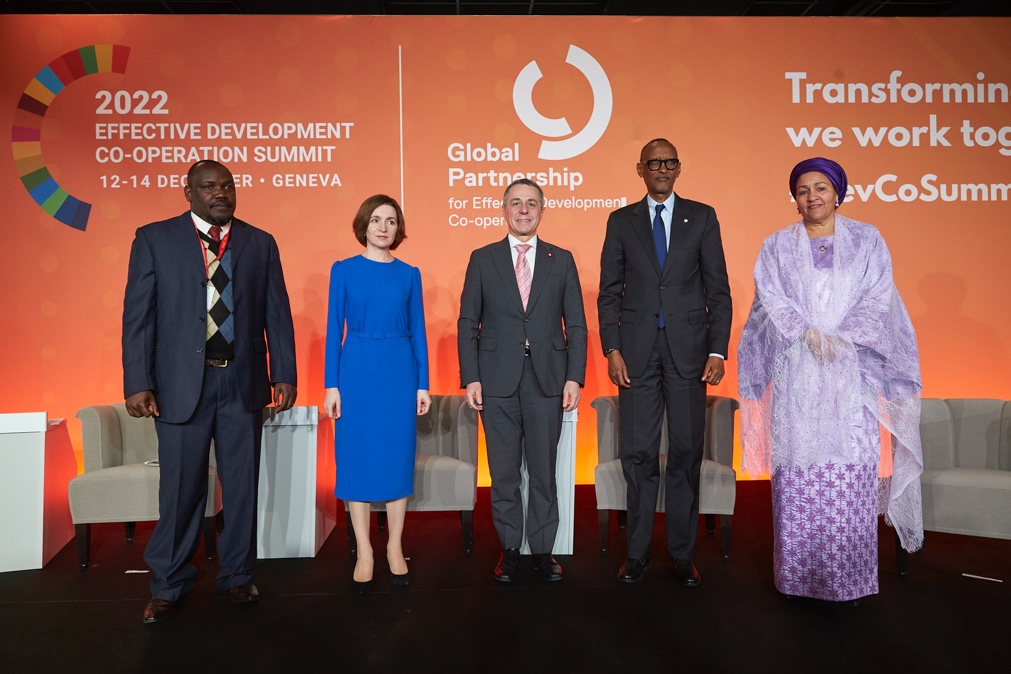Convening key development co-operation stakeholders from all over the world, the 2022 Effective Development Co-operation Summit of the Global Partnership closed with an adoption of the Geneva Summit Declaration, aimed to anchor future decision-making around the four effectiveness principles and strengthen progress towards the Sustainable Development Goals (SDGs).
Recognizing the importance of transforming the way we work together, Ms. Amina J. Mohammed, United Nations Deputy Secretary-General stated that “Today’s challenges require collective action that is country-led, result-oriented, inclusive, and transparent. Put simply, we need multilateralism that delivers for all people.”
The global Summit emphasized the need for effective development co-operation which is country-led, results-oriented, transparent, and accountable. This would allow partners to build the necessary trust for inclusive partnerships and improved sustainable development outcomes. H.E. Ms. Maia Sandu, President of Moldova in her opening remarks stressed that “we need development solutions that are better tailored to the challenges faced by different countries”. A Special Report, issued by the Global Partnership, emphasized the current state of development co-operation and lessons learned from 15 Action Dialogues led by governments at country-level in 2021 and 2022.
In his opening address, Mr. Ignazio Cassis, President of the Swiss Confederation said that what differentiates us should not divide us – “Common values and a mutual respect are our compass. We must take responsibility and act together. This is the raison d'être of the Global Partnership."
Since 2019, Switzerland has represented development partner countries as Co-Chair of the Global Partnership for Effective Development Co-operation. In this role and as host of the Summit, Switzerland led the drafting of a renewed commitment to effective development alongside a vision for how an improved Global Partnership can support policy and behaviour change in countries in the Summit Declaration.
In addition to an action-oriented Declaration, the Summit launched the new Global Partnership monitoring exercise. As the globally-recognised source of evidence that countries live up to their effectiveness commitments, the renewed exercise is set to further drive accountability with enhanced focus on a country-anchored process to reflect on the monitoring results, encourage inclusive and evidence-based dialogue and bring about behavior change.
The new exercise now also features an assessment of the Kampala Principles, which focuses on the increasing use of development co-operation resources to engage the private sector in partnerships. H.E. Mr. Paul Kagame, President of Rwanda welcomed the new monitoring framework with its focus on private sector engagement, stating that ''The Global Partnership for Effective Development Co-operation brought us even closer together in our quest for better outcomes.'' More than 35 countries have already committed to lead the monitoring exercise in their countries, beginning in 2023.
- Plenary session recordings are available on YouTube. All other session-specific recordings will be made available shortly: https://bit.ly/3uKM2af
- Official webpage: https://www.effectivecooperation.org/hlm3
- Official photos are on Google Photos: https://bit.ly/3uL7QCt

(Left to right) Mr. Vitalice Meja, Co-Chair of the Global Partnership for Effective Development Co-operation, H.E. Ms. Maia Sandu, President of Moldova, H.E. Mr. Ignazio Cassis, President of the Swiss Confederation, H.E. Mr. Paul Kagame, President of Rwanda and Chair of AUDA-NEPAD and Ms. Amina J Mohammed, United Nations Deputy Secretary-General
Media contacts
